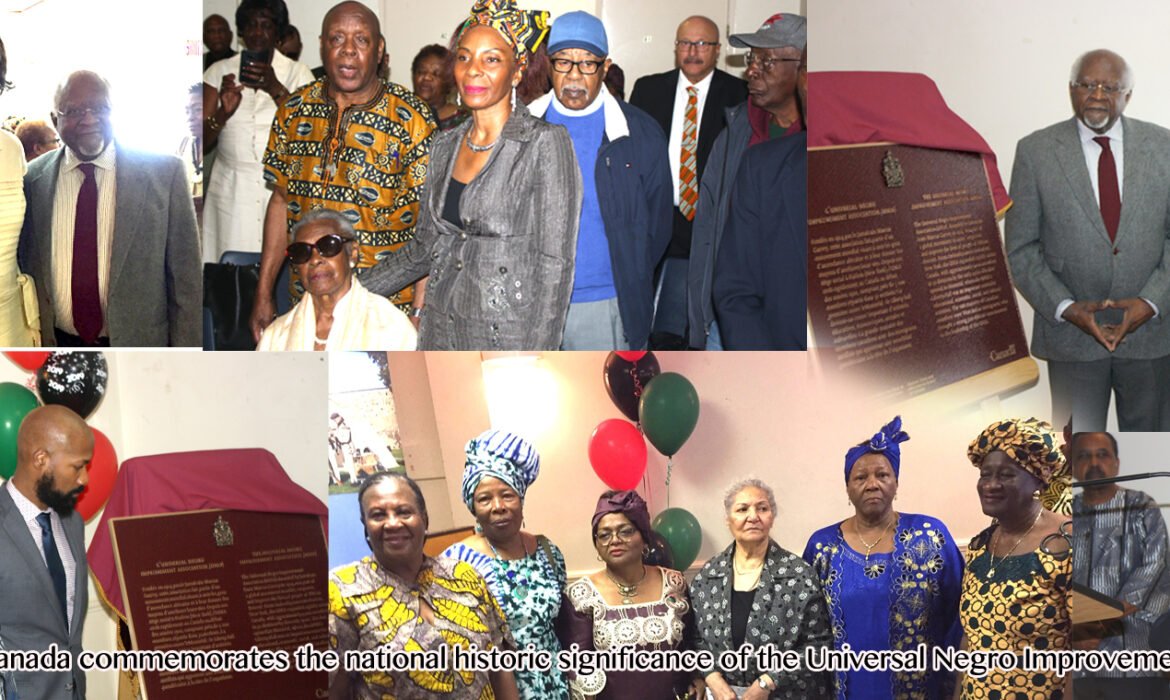Government of Canada commemorates the national historic significance of the Universal Negro Improvement Association
Contact Staff
One hundred years after the organization founded by the Rt. Honorable Marcus Garvey established a foothold in Canada, the Universal Negro Improvement Association (UNIA) was recognized by the Canadian government for its role “in fostering unity and pride among Canadians of African descent.”
The recognition came in the form of a commemorative plaque designated by Parks Canada and unveiled at an invitation-only ceremony on June 14 at the UNIA’s Liberty Hall in St. Henri.
Marc Miller, Liberal member of Parliament for Ville-Marie—Le Sud-Ouest—Île-des-Sœurs, the area where the UNIA has been located for the past hundred years, spoke on behalf of his government, pointing to the association’s glorious history as a force of empowerment to people of African descent.
“On behalf of the Government of Canada, I am honored to commemorate the national historic significance of the Universal Negro Improvement Association in Canada,” he told the standing-room-only crowd. “The UNIA played a key role for Black Canadians to help develop their talents and assume positions of leadership at a time when they were denied these opportunities elsewhere. Historic designations reflect Canada’s rich and varied history, our multiculturalism and our diversity. I encourage all Canadians to learn more about the Universal Negro Improvement Association and its important contributions to Canada’s heritage.”
For his part, Miller, who since he was elected in 2015 has been a consistent voice in parliament on behalf of Blacks and other minorities, intimated to the gathering at the UNIA that he was schooled on Garvey and other Black leaders and institutions from frequent interactions with the late Bob White.
He is the former chairman of the Quebec Liberal caucus and serves as Parliamentary Secretary to the Minister of Crown-Indigenous Relations.
Association’s president Randolph Pierre offered one of the opening statements
And Rolph Francois, a board member, who initiated the project, accepted the plaque on behalf of the local membership and spoke on their behalf.
Another of the featured speakers was Dr. Julius Garvey, the younger of two sons of Marcus and Amy Jacques Garvey. The Jamaican born M.D. earned his medical degree here at McGill University in 1961.
And local historian/musician Julian McIntosh traced the timeline of Garvey and the UNIA.
Mervyn Weekes, who serves as treasurer and public relations officer of the UNIA, says the recognition by the government has been long in coming but welcomed by a proud membership, many of whom have been with the association for decades.
He says: “We’ve put in a lot of work asking the various levels of government to recognize and pay tribute to individuals who have impacted on our community and Canadians in general, including our great leader Marcus Garvey.”
So he says it’s indeed a “proud” and fulfilling moment for the UNIA.
He also pointed to the widespread participation of the community in the commemorative event, and the spectacular performances by the West Can Drummers, Jonathan Emile and Odessa Thornhill.
The UNIA’s commemorative plaque is one of about 2,150 recognitions by the Historic Sites and Monuments Board of Canada “of significant people, places, and events that have shaped our country as one way of helping Canadians and youth connect with their past.”












